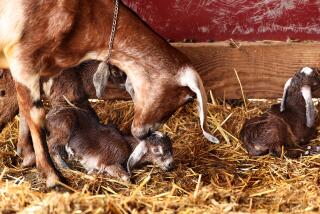Emus, Ostriches and Llamas All Get Along on a Virginia Farm Menagerie
- Share via
ISLE OF WIGHT COUNTY, Va. — Jimmie Spady shakes a jug of horse feed. “Come here, Zeby,” he calls.
A zebra prances over and digs its nose into the food. At Spady’s left hand, llamas and miniature donkeys jostle for room at the food bucket he holds. One perturbed llama spits on another.
“All right, girls,” Spady tells them. “Cut it out.”
It takes Spady two or three hours every day to feed the animals. He keeps African ostriches and rheas -- ostriches’ South American cousins -- emus, peacocks, fainting goats and geese that stand up like penguins.
He’s probably got a couple hundred animals, if you include the various ducks, geese, pheasants and cats scattered throughout the pens, sheds and red coops on his 28-acre Oak Crest Farm near Smithfield, Va.
Years ago, when emus were fetching more than $25,000 a pair, it was a lucrative business. Then the market became glutted, and now he’s lucky to get $50 for a baby, he says. Today, keeping the domestic and exotic menagerie is “just a backyard hobby,” he says.
“You raise cattle. You raise hogs,” says Spady, whose truck license plate reads “Zoo Man.” “Maybe somebody thinks it’s unusual, but it’s just what I do.”
His collection is smaller than it once was, says Spady, who lives alone but gets help from two other people.
“My theory is an empty pen is a good pen, now that I’m getting older,” says Spady, 68. “Buckets are getting heavier, and the hills are getting steeper.”
The first pet Spady remembers is a goldfish his parents bought him when he was 4 or 5. He started stockpiling animals once he earned some money working the oyster business founded by his grandfather.
When the oystering business soured about 20 years ago, he had more time to spend with his animals. Many have names. There’s Jack, probably Spady’s favorite, a miniature donkey. There’s Sampson and Delilah, ostriches that weigh about 300 pounds apiece. There’s Trio, the three-legged cat Spady saved from being euthanized.
And there’s Rotten, a 7-month-old spoiled-rotten brush goat that wears a rhinestone-studded collar and frolics on a plastic Toys-R-Us play set. She bawls for attention until Spady lets her out of her pen.
Although some pens are home to several species, the animals all get along. One fluffy chicken even adopted 3-foot-tall East African crowned cranes as her own. After all, she did sit on the eggs and hatch them.
“They step on her accidentally sometimes, but she’s their mother,” Spady says. “They follow her wherever she goes.”
It can get noisy. Geese honk. Female emus emit a drum-like sound. Donkeys hee-haw. A baby goat bleats.
And his baby llamas and donkeys are still for sale. Miniature male donkeys sell for about $500, females for $1,000, he says.
“It’s been a good experience,” he says. “You have to be able to take the good with the bad.”
A few months ago, Pistol, a miniature horse he’d had for years, died.
“That was sad,” Spady says. “Then you have something cute or pretty that’s born. I’ve always said a little baby duck, a little baby goat, is the cutest thing ever.”
More to Read
Sign up for The Wild
We’ll help you find the best places to hike, bike and run, as well as the perfect silent spots for meditation and yoga.
You may occasionally receive promotional content from the Los Angeles Times.





